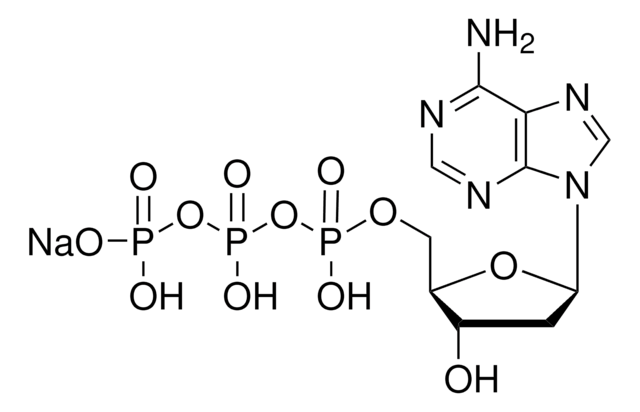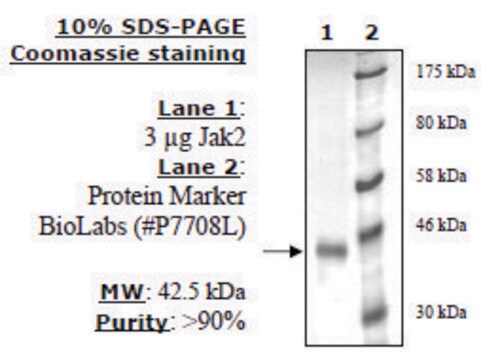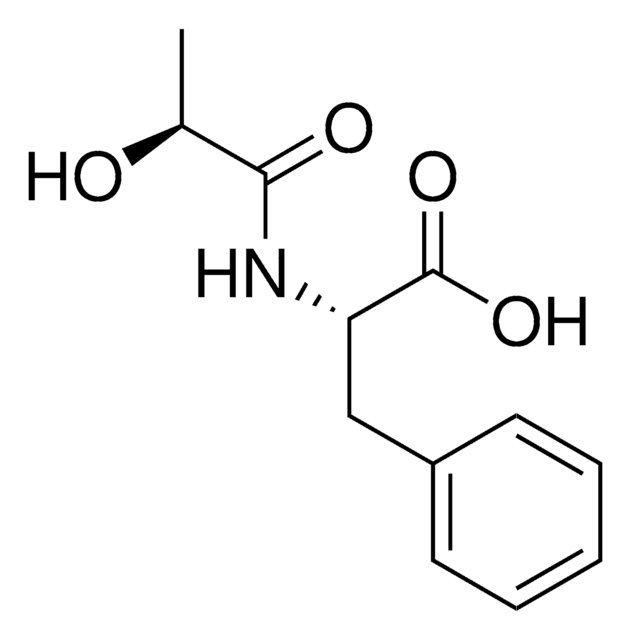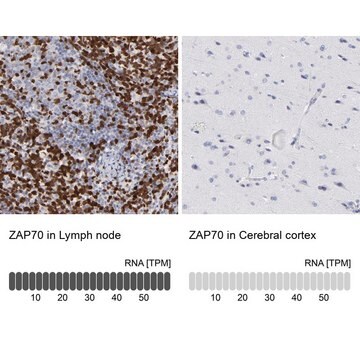Z2126
ZAP-70 Tyrosine Kinase human
≥90% (SDS-PAGE), recombinant, expressed in baculovirus infected insect cells (Histidine tagged), buffered aqueous glycerol solution, ≥150 U/mg
Sign Into View Organizational & Contract Pricing
All Photos(1)
About This Item
Recommended Products
recombinant
expressed in baculovirus infected insect cells (Histidine tagged)
Quality Level
Assay
≥90% (SDS-PAGE)
form
buffered aqueous glycerol solution
specific activity
≥150 U/mg
mol wt
70 kDa
UniProt accession no.
shipped in
dry ice
storage temp.
−70°C
Gene Information
human ... ZAP70(7535)
Application
Human ZAP-70 Tyrosine Kinase was used for mapping the phosphorylation sites on LAT (linker for activation of T cells) for investigating the mechanism of activation of signalling proteins in T cells.
Biochem/physiol Actions
ZAP-70 Tyrosine Kinase is a protein belongs to Syk family and is essential for T cell activation. It facilitates the upregulation of Fas ligand in activation-induced T cell apoptosis. Additionally, it also plays a pivotal role in LFA-1-dependent T Cell Migration.
ZAP-70 is protein tyrosine kinase of the Syk family that is localized exclusively to the cytosol of T cells and natural killer cells. It is required for T cell activation. It is activated by Lck-mediated phosphorylation of its tyrosine residues.
Unit Definition
One unit will phosphorylate 1 nmol polyglutamic acid:tyrosine per min at 37 °C at pH 7.0.
Physical form
Solution in 25 mM HEPES, pH 7.5, containing 150 mM NaCl, 0.5 mM DTT, and 50% glycerol.
Storage Class Code
10 - Combustible liquids
WGK
WGK 1
Choose from one of the most recent versions:
Already Own This Product?
Find documentation for the products that you have recently purchased in the Document Library.
C M Eischen et al.
Journal of immunology (Baltimore, Md. : 1950), 159(3), 1135-1139 (1997-08-01)
Activation-induced cell death (AICD) is initiated by the TCR-dependent up-regulation of Fas ligand (FasL) mRNA. The subsequently generated soluble or cell-associated FasL gene products bind Fas, leading to apoptosis of the T cells. Although TCR stimulation is essential to initiate
P E Paz et al.
The Biochemical journal, 356(Pt 2), 461-471 (2001-05-23)
T-cell-receptor (TCR)-mediated LAT (linker for activation of T cells) phosphorylation is critical for the membrane recruitment of signalling complexes required for T-cell activation. Although tyrosine phosphorylation of LAT is required for recruitment and activation of signalling proteins, the molecular mechanism
R D Soede et al.
The Journal of cell biology, 142(5), 1371-1379 (1998-09-10)
The ZAP-70 tyrosine kinase is essential for T cell activation by the T cell receptor. We show that ZAP-70 is also required for migration of T cells that is dependent on the integrin LFA-1. Invasion of TAM2D2 T cell hybridoma
D H Chu et al.
Immunological reviews, 165, 167-180 (1998-12-16)
The processes of T-cell development and activation employ similar immature and mature receptors as well as similar signal transduction pathways to achieve different outcomes. Many signaling molecules are shared between the receptor signaling pathways, including two families of cytoplasmic protein
Our team of scientists has experience in all areas of research including Life Science, Material Science, Chemical Synthesis, Chromatography, Analytical and many others.
Contact Technical Service







